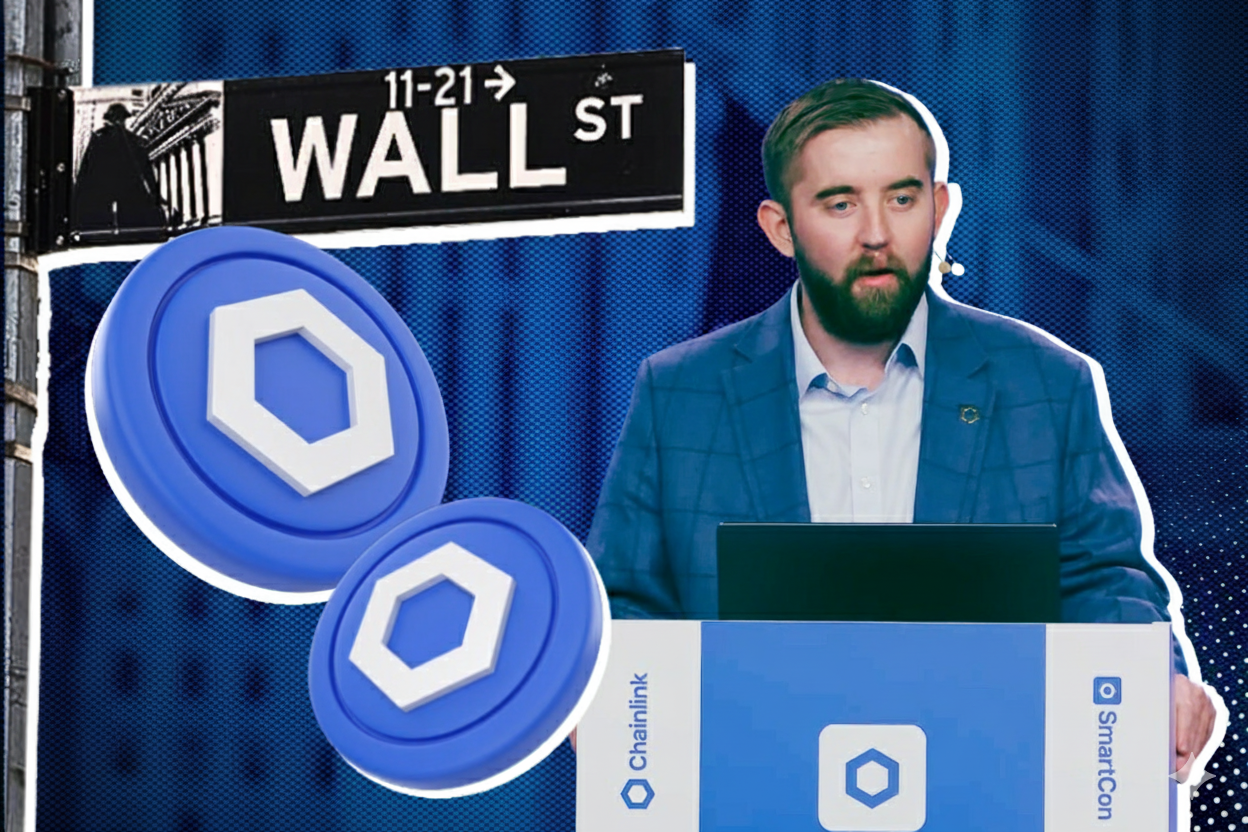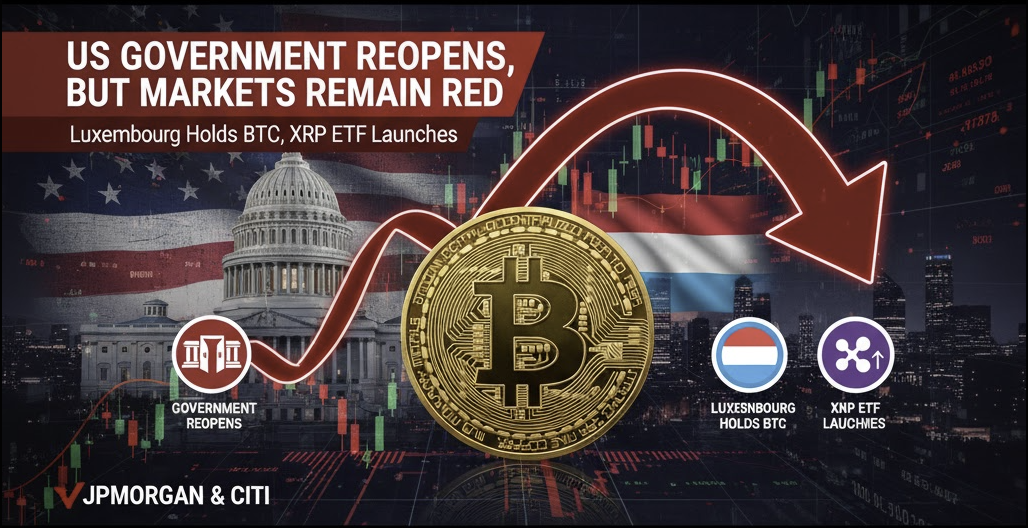Bitcoin experienced a slight correction after reaching a new all-time high. The crypto market continues to receive positive news, indicating underlying strength.
Market Overview
US equities closed with slight gains across all three indices on Monday, July 14th, largely unaffected by tariff news. Stock futures saw a minor decrease. Oil contracts fell to $66.7 per barrel. Gold held steady at $3356 per ounce.
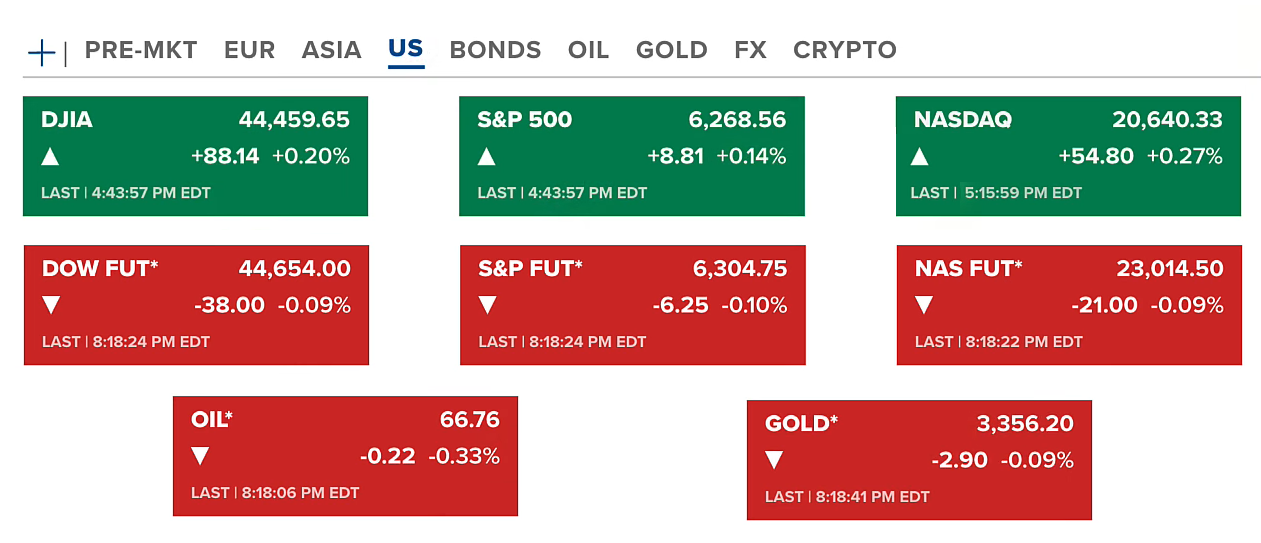
Bitcoin, after reaching a new all-time high above $123,000, has corrected to around $117,000. Many altcoins continue to see strong growth. The overall crypto market capitalization stands at $3.7 trillion. For altcoins to sustain growth, the market generally needs to see Bitcoin's continued upward momentum.
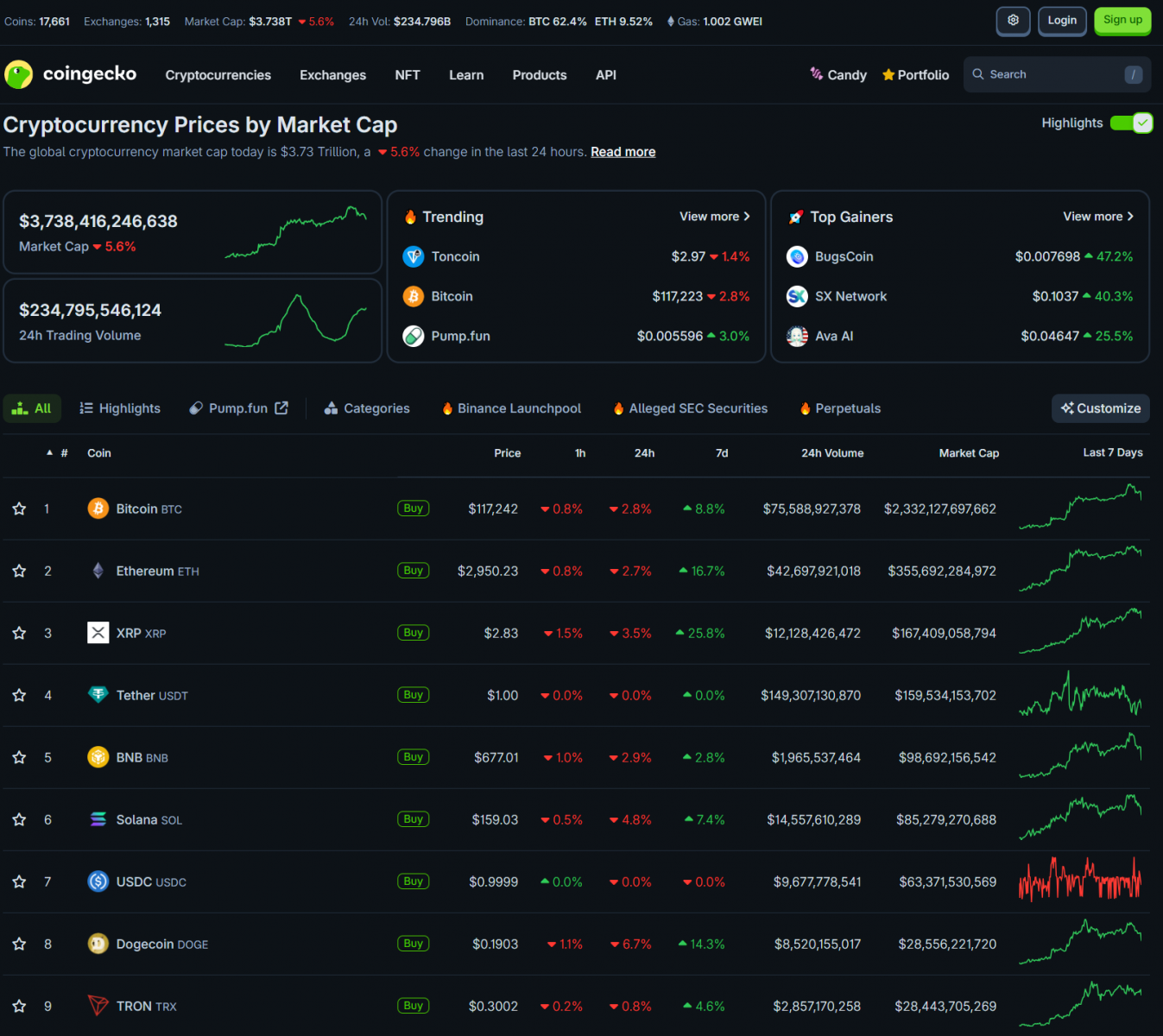
US Bitcoin spot ETFs saw another positive inflow day on Monday, attracting $297 million. ETH spot ETFs recorded a healthy inflow of $259 million. The SOL spot ETF, however, saw zero net inflow.
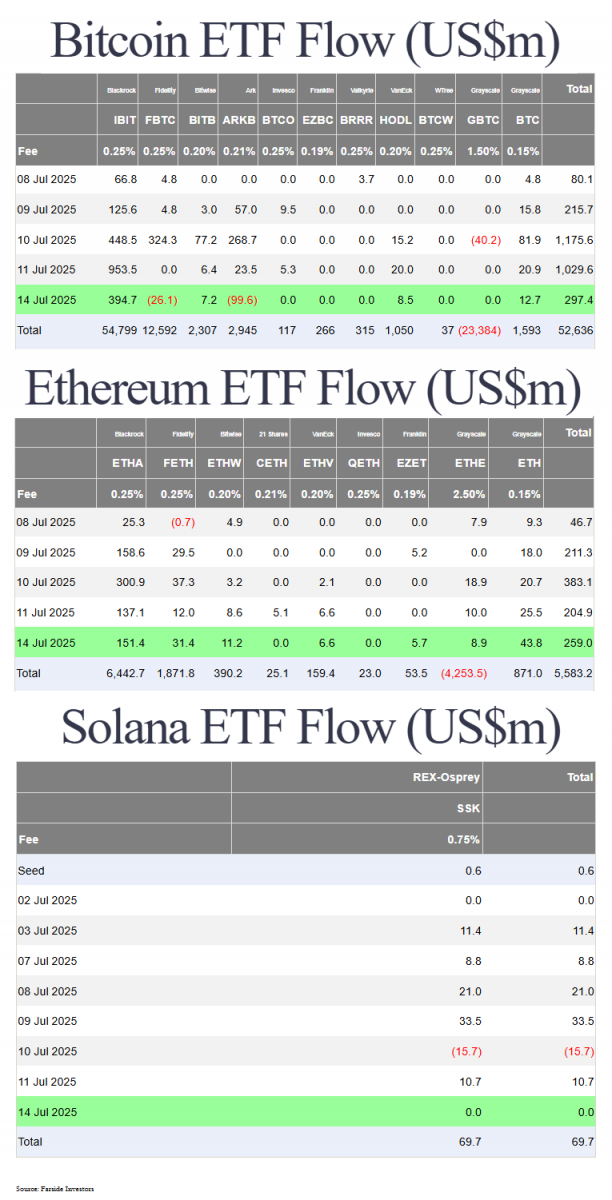
BlackRock's Bitcoin Spot ETF (IBIT) has achieved remarkable success, reaching $88 billion in assets in just 1.5 years. This rapid growth is attributed to strong inflows and Bitcoin's price appreciation. Currently, IBIT is the 20th largest ETF in the US, the 7th largest in BlackRock's portfolio, and also their most profitable ETF. Eric Balchunas from Bloomberg suggests that the $100 billion milestone could be reached as early as this month, sooner than anticipated. This unprecedented growth in Bitcoin ETFs highlights the accelerating institutional adoption of digital assets.
Tariff Updates: Trump Imposes Tariffs on Russia, Global Trade Concerns Mount
Yesterday, President Trump warned he would impose secondary tariffs of up to 100% on countries that continue to trade with Russia if Putin does not agree to end the conflict within 50 days. This punitive tariff targets third-party countries or companies (such as China, India, Brazil, or Turkey) that continue to purchase goods from Russia. The goal is to cut off Putin's financial resources without direct military confrontation.
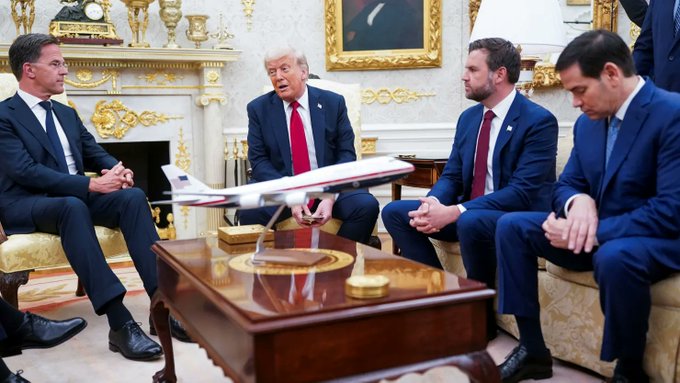
President Trump stated: "We are very, very unhappy with them, and we are going to impose very heavy tariffs. If there's no agreement in 50 days, the tariff will be about 100%. They call it secondary tariffs." Since the US has already banned Russian goods, direct tariffs on Russia are no longer effective. Instead, Trump is threatening to impose a 100% tariff on imports from the aforementioned countries if they do not cease commercial cooperation with Russia.
While it remains unclear whether Trump will actually implement these tariffs or is merely using a "threat to negotiate" strategy, this move raises concerns about a new trade war. However, financial markets generally maintained an optimistic stance, closing slightly in positive territory. This suggests that the market might view these tariffs as political posturing rather than an immediate, devastating economic blow.
The Global Surge in Corporate Bitcoin Accumulation
The accumulation of Bitcoin by corporations is rapidly accelerating worldwide, with an increasing number of businesses across diverse sectors entering the cryptocurrency market as part of their long-term investment strategies. Recently, numerous companies in Europe and North America have announced significant Bitcoin purchases, signaling growing confidence in the growth potential of this digital asset.
In Norway, K33, a crypto-focused financial services and research firm, acquired an additional 36 BTC, bringing its total holdings to 121 BTC. Meanwhile, Sequans Communications, a French telecom company specializing in 5G chips and the Internet of Things, has also actively entered the market with the purchase of 683 BTC, raising its total ownership to 1,053 BTC.
Canada is seeing notable participation from Matador Technologies, an investment and technology development company focused on Bitcoin and artificial intelligence (AI) infrastructure. Matador has filed for a capital raise of up to 900 million Canadian dollars over the next 25 months, aimed at expanding its Bitcoin accumulation, executing strategic acquisitions, and developing its technology infrastructure ecosystem.
In France, The Blockchain Group—a technology company specializing in blockchain and distributed software solutions—purchased an additional 29 BTC, bringing its total Bitcoin holdings to 1,933 BTC. Meanwhile, in the UK, Tao Alpha officially rebranded to Satsuma Technology and recently made its first Bitcoin acquisition of 28.56 BTC. Satsuma focuses on investing in technology, particularly blockchain and Bitcoin. This rebranding will officially take effect on the London Stock Exchange (LSE) tomorrow, with a new ticker symbol: $SATS.L.
Beyond corporate accumulation, renowned investors are also participating. Robert Kiyosaki—author of "Rich Dad Poor Dad"—shared that he has bought more Bitcoin and advises those still on the sidelines to consider joining, even with a small amount to start. However, he also stated he would pause further purchases until he has a clearer view of the economic situation, while warning of a potential market crisis in the near future.
In another significant development, US investment firm Bernstein recently forecasted that Bitcoin could reach $200,000 by the end of 2025 or early 2026. This projection is based on a strong confluence of supporting factors, including increasing demand from institutional investors, Bitcoin's limited supply (capped at 21 million coins), and its increasingly clear role as a store of value amidst volatile global economic conditions. Bernstein believes the market is entering a prolonged growth cycle, and Bitcoin will soon become an indispensable part of professional financial institutions' long-term portfolios.
Bitcoin: From Skepticism to Conviction – A Global Asset's Journey
Bitcoin continues to be a central focus in the financial world, not only as the first digital currency but also as the largest asset in the crypto space. With its strong price surge recently, Bitcoin's market capitalization has surpassed Amazon, becoming the fifth largest asset globally. Despite existing for over 15 years, Bitcoin remains a controversial topic, divided between profound believers and outright skeptics or opponents.
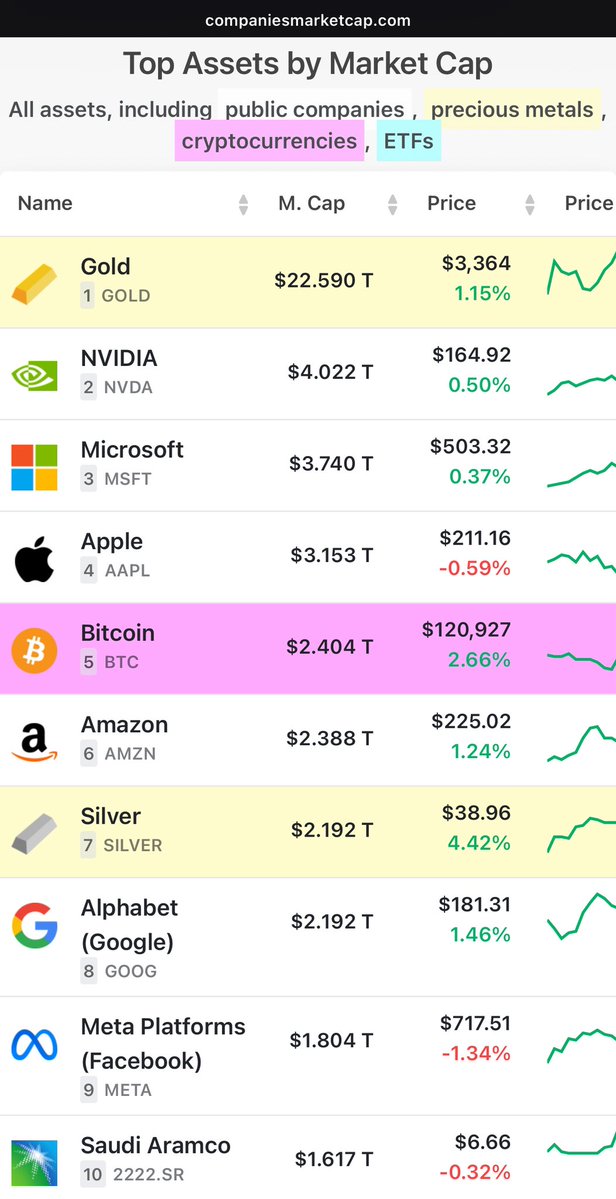
The increase in value has widened the gap between those who own and those who do not own Bitcoin. Just a few years ago, in 2020, the price of one BTC was under $5,000—still a significant amount but within reach for many. Now, with Bitcoin approaching $120,000, even for many wealthy Americans, spending such a large sum to buy one BTC is no longer simple. This has also broadened the conviction gap: those who already own it believe even more strongly, while those who don't are more likely to deny Bitcoin's value.
Skepticism towards Bitcoin is something almost everyone has experienced, including many who are now major investors in the field. Even Michael Saylor—now famous as a Bitcoin maximalist and leader of a company holding substantial BTC—once publicly called Bitcoin worthless, online gambling, and destined to go to zero. Similarly, Thuận himself—who worked in traditional finance since 2008—initially didn't believe in Bitcoin when he first learned about it in 2010, because it contradicted everything he had learned and understood about the financial system.
However, Bitcoin's volatile journey and strong recovery after multiple crashes have solidified the belief of many. From 2013 when its price was just $200, to 2018 at $3,500, 2020 at $4,000, then 2022 dropping to $15,000, each time it collapsed, Bitcoin emerged stronger. And whenever the market goes quiet, devoid of "FOMO" waves, there is always a silent force accumulating, those who hold a long-term conviction.
That conviction doesn't come from scarcity, though Bitcoin's fixed supply is widely known. Conviction forms over time, through experience, and through the repetition of a cycle: fall – recover – new peak. This makes the belief in Bitcoin different from traditional assets like gold, real estate, or stocks, which are often implicitly assumed to have value from the outset. With Bitcoin, almost everyone starts with doubt.
Robert Kiyosaki, one of the most influential voices in the personal finance community, has also warned about financial crises for many years. He believes Bitcoin is a crucial part of a long-term defensive portfolio. However, at the current time, he states he is temporarily pausing further Bitcoin accumulation to observe the situation, while advising those who don't yet own BTC to start with small amounts.
In conclusion, what gives Bitcoin its enduring vitality is not just its technology, scarcity, or price forecasts. It is the journey of an asset moving from being dismissed, to gradually being recognized, not because it is perfect, but because over time, the skeptics have slowly become the strongest believers. And that very belief, resilient through crashes, is the solid foundation for Bitcoin's future.
Record Budget Deficit Fuels Bitcoin's Surge
The current economic situation is far from normal. Bitcoin is continuously rising, setting multiple new highs amidst high interest rates, an 11% depreciation of the US dollar in the past 6 months, and over $1 trillion flowing into the crypto market in just the last 3 months. Since the US House of Representatives passed President Trump's budget bill on July 3rd, Bitcoin's price has surged by over $15,000. This is not a random reaction but a sign that the market is reflecting deep systemic risks.
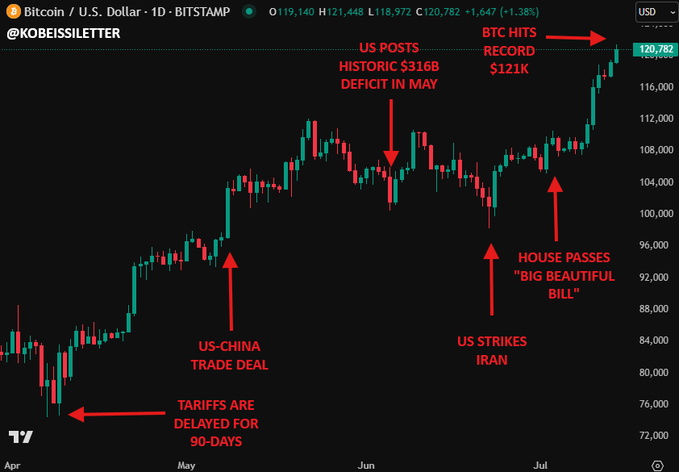
Despite initial reactions from Elon Musk, the market quickly realized a reality: the US budget deficit is becoming a serious and uncontrollable problem. The Kobeissi Letter calls this a "crisis regime." Gold is rising. Bitcoin is rising. The US dollar is falling. And risk assets like tech stocks continue to increase, but not due to internal economic strength but due to fears of currency devaluation and uncontrolled fiscal policy.
Since 2012, the S&P 500 has lost 99.98% of its value when converted to Bitcoin. In 2025 alone, this index has decreased by 15% in Bitcoin terms. Bitcoin is not just appreciating; it is asserting a superior position compared to all traditional assets.
Major financial institutions are also involved. The IBIT ETF has reached $76 billion in assets under management in less than a year, a figure that the largest gold fund took over 15 years to achieve. Family offices, hedge funds, and even conservative institutions are gradually allocating to Bitcoin, even if only with an initial 1%.
This is no longer a temporary speculative wave. This is a direct consequence of uncontrolled fiscal policy. In the short term, the market may continue to rise. But in the long term, risks of inflation, currency weakening, and macroeconomic instability cannot be underestimated.
US Issues Official Guidance for Bank Crypto Custody
The three largest US banking regulators—the Office of the Comptroller of the Currency (OCC), the Federal Reserve (Fed), and the Federal Deposit Insurance Corporation (FDIC)—have jointly issued common guidance on how banks should approach custodying crypto assets for clients.
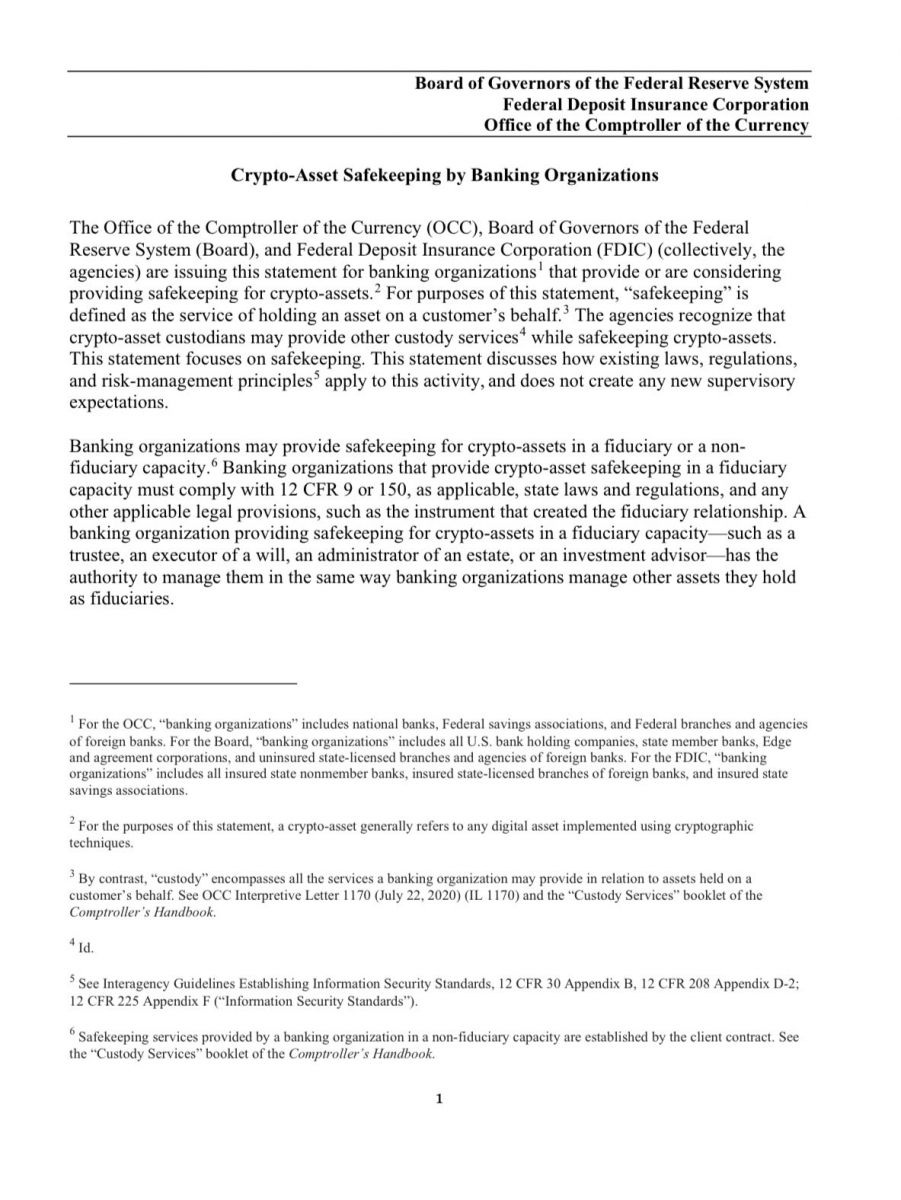
The guidance does not create new regulations but emphasizes that banks must apply existing principles for risk management, legal compliance, and general compliance when custodying crypto. Banks can hold crypto on behalf of clients, whether in a fiduciary capacity or not, but must fully comply with laws and maintain strict risk management.
Key risks banks must consider include:
- Cybersecurity
- Private key management
- Crypto market volatility
- Compliance with anti-money laundering (AML), counter-terrorist financing (CFT), and OFAC sanctions laws
- Oversight of third-party providers
If a bank holds private keys, it assumes full responsibility. Full control means full responsibility. Banks are permitted to hire third-party crypto custodians, but they remain responsible and have an obligation to oversee and vet their partners. In summary, regulators agree to allow banks to hold crypto, but this activity will be tightly supervised and carries very high potential legal liability. This guidance provides a framework for traditional banks to safely engage with digital assets, potentially paving the way for broader institutional adoption.
Other Key Crypto & Market Updates
Aave, a DeFi lending platform, has surpassed $50 billion in deposits, becoming the first DeFi protocol to reach this milestone. Aave's growth is attributed to the appreciation of crypto assets and the use of stablecoins for yield farming. The platform supports stablecoins like USDC and PYUSD as collateral. Aave is also improving with its Aave V4 version, with plans to support additional Bitcoin Layer 2 assets and expand Aave's GHO stablecoin to other blockchains.
Strategy (MicroStrategy) has completed the purchase of an additional 4,225 BTC for approximately $472.5 million, at an average price of about $111,827 per Bitcoin. Following this transaction, Strategy's total Bitcoin holdings have increased to 601,550 BTC, with a total value of approximately $42.87 billion and an average purchase price of $71,268 per BTC. This marks continued aggressive accumulation by the publicly traded firm.
Metaplanet, another publicly traded company, acquired an additional 797 BTC, increasing its total holdings to 16,352 BTC. This further solidifies the trend of corporate Bitcoin accumulation.
Despite its historical opposition to Bitcoin, Vanguard now holds nearly 8% of Strategy's shares—a company that holds a significant amount of BTC. This index-investing strategy has made Vanguard a major shareholder of Strategy, providing indirect exposure to Bitcoin. Bloomberg calls this an "interesting paradox," highlighting the evolving landscape of traditional finance's indirect exposure to crypto.
The Fed is facing strong criticism for its $2.5 billion headquarters expansion project, labeled as "mismanagement" and "extravagant waste." The White House, President Donald Trump, and other officials are concerned that the Fed is spending independently without congressional oversight. The Fed explains that cost increases are due to materials and safety, but many argue this indicates poor management and a loss of direction. This internal controversy adds another layer of pressure on the central bank.
Sources
- Bloomberg
- CoinDesk
- U.S. Treasury
- TradingView
- Reuters
- SEC
- White House Press Office
- CryptoQuant
- Glassnode
- Office of the Comptroller of the Currency (OCC)
- Federal Reserve (Fed)
- Federal Deposit Insurance Corporation (FDIC)
- Aave Protocol
- Strategy (MicroStrategy) Investor Relations
- Metaplanet Investor Relations
- The Kobeissi Letter
- Robert Kiyosaki
Disclaimer
This article is for informational purposes only and should not be considered financial advice. Please do your own research before making investment decisions.

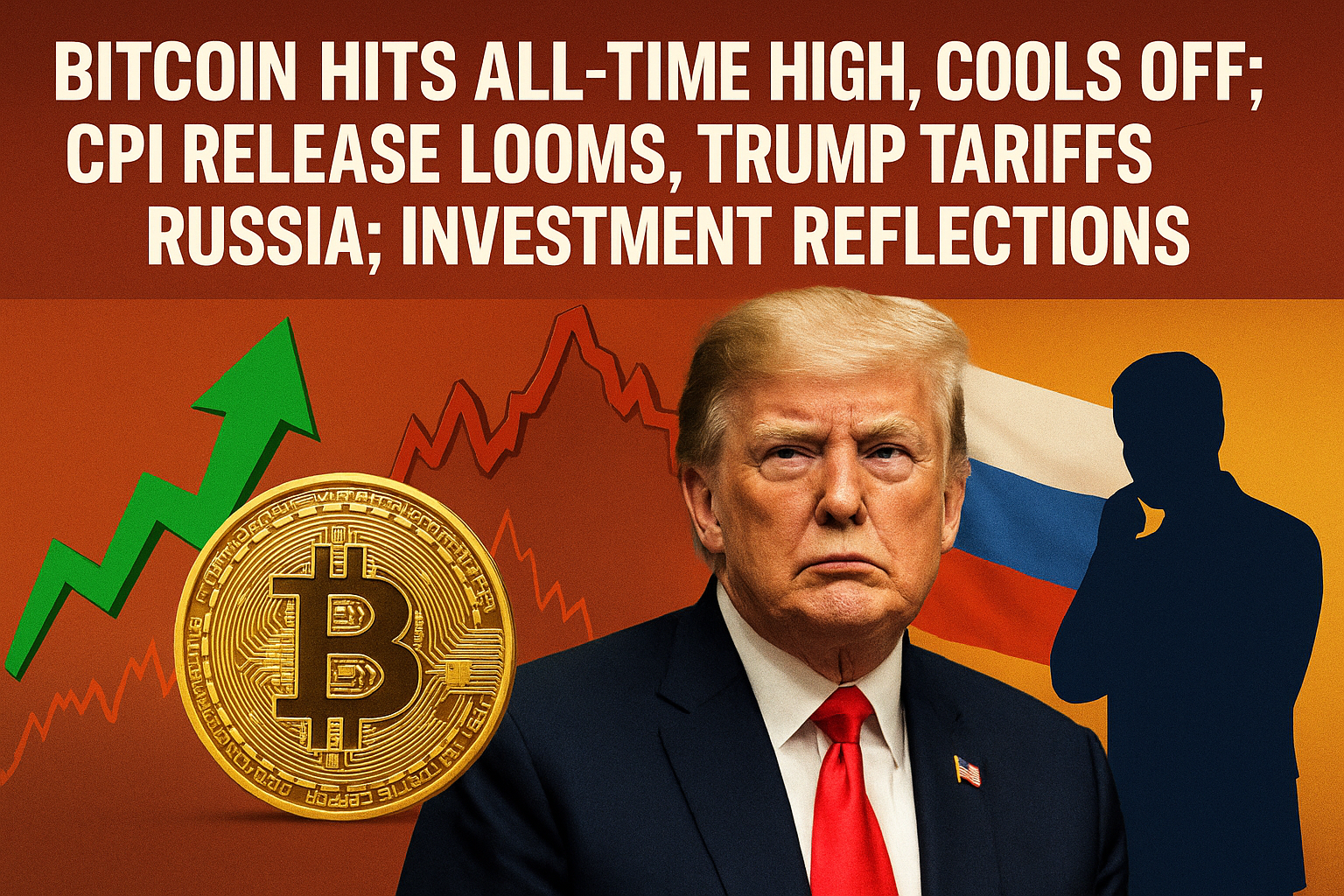
.png)



